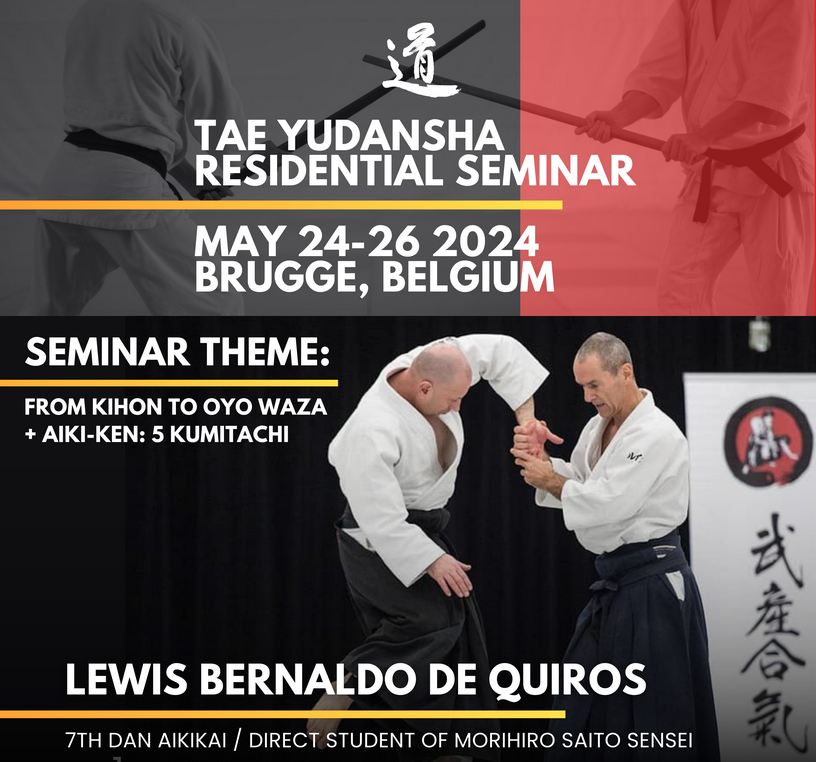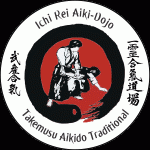Yudansha Seminar may 24-26 2024, Bruges Belgium
SEMINAR THEME:
From kihon to oyo waza + Aiki-ken: 5 kumitachi
In 2024, after a few years break, we are again able to hold a seminar in the beautiful medieval city of Brugge hosted perfectly as always by Filip Schuerbeke Sensei and his group.
In this Yudansha seminar in Taijutsu I would like to cover four levels of our system:
Kihon
Ki no nagare
Henka
Oyo waza
Each level develops knowledge and abilities that allow access to the next level.
Kihon is the foundation for the whole system. What is important at this level is balancing movement with stillness in the techniques while understanding how to work with the transitions from one to another. At the Kihon level we ‘bind’ and integrate the body into one system where everything (intention energy body) becomes aligned with the purpose of our actions.
‘How’ we train at this level is very important. Incorrect training will generally negate further development. For example, at this level one ability we seek is to source our power in the ground and express it in a coordinated way through the body. If we are attacked beyond our ability to work on this aspect then we will end up struggling against our partners using predominantly upper body strength thus making is very difficult to learn the aforementioned principle.
The transition from Kihon to Ki no nagare requires that our Kihon takes on a ‘soft flexible’ quality (yawarakai). The is essentially a movement from ‘externally’ coordinated Aikido to a more centrally controlled way of moving which in turns allows for the periphery (body armour) to soften. This ‘softening ‘ is in actual fact a relaxing down into the ground which allows for greater balance and coordination around the center.
Ki no nagare is fluid dynamic Aikido but the great danger here is disconnection. The three fundamental ways in which this can take place will be looked at.
Henka waza. The ability to fluidly change techniques as circumstances demand. This level requires that the basic techniques are well integrated and can be performed ‘unthinkingly’. And secondly, that our ability to ‘stick’ and ‘follow’ the movements and changes of our partner are well established.
Oyo waza. Practical ‘combat’ applications. This level requires all the previous levels plus a good knowledge of atemi. Specific atemi will be studied and drills for Aikidoka to develop minimal skill in this area introduced. Oyo waza (as Henka waza) is not a set of techniques to be memorised but an understanding expressed technically. The techniques we will look at are therefore to be considered as ‘examples’.
In Bukiwaza I would like to exclusively focus on Aiki-ken and the 5 Kumitachi with their variations. As with Taijutsu we will build them up from the suburi through awase work to basic Kumitachi to flowing and variation levels. As in the Taijutsu, each level in the system develops the abilities necessary for the next.
schedule:
The training will take place in two locations which are close to each other in Brugge:
Hall A: Sports Center Sport.Vlaanderen, Nijverheidsstraat 112, 8310 Brugge (Friday evening and Sunday morning)
Hall B: Sports Center Xaverianen, Xaverianenstraat 13, 8200 Brugge (Saturday).
Friday
Hall A
17:00-19:00 Bukiwaza and Taijutsu.
20:00 Dinner in Brugge (cost not included in seminar fee)
Saturday
8:00 Breakfast in Hall A
Hall B
10:00-12:00 Taijutsu
12:00-13:30 Lunch
13:30-16:00 Taijutsu
16:00-17:00. Review and Questions
17:00-18:00. Pre tests / Examinations.
19:00 Dinner
21:00 Party in Hall A
Sunday.
Hall A
8:00 Breakfast
09:30-10:45 Bukiwaza
11:00-12:15 Taijutsu
13:00 Lunch
Cost.
This is a residential seminar with the cost covering accommodation in Hall A plus all meals (except the dinner on Friday night) and training sessions (10 hours total) included in the price.
Maximum price is 275 euros. Register and pay before January the 1st for a 10% discount.
Insurance.
Participants must be adequately insured.
Weapons.
Bring own weapons.
For who?
For 1st kyu and above.
Information
For more information contact: Filip Schuerbeke at: info@irad.be

